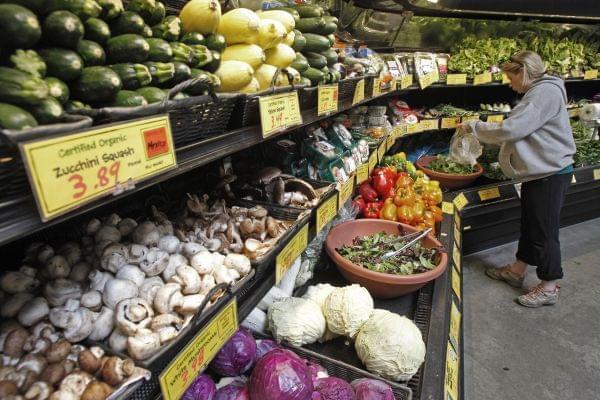Bill Would Block State Labeling Laws On Genetically Modified Foods

Vermont's 17 food cooperatives are supporting a bill that would require the labeling of genetically modified foods. The co-ops said that their member owners want to know which foods in their stores contain genetically modified organisms. (AP Photo/Toby Talbot)
A bipartisan group of lawmakers from Missouri and Illinois are co-sponsoring legislation to make labeling of genetically modified foods voluntary as a national standard and to block individual states from adopting their own laws.
Barring a federal law to circumvent it or court action to block its implementation, beginning next year, a Vermont law requires companies to label genetically engineered food.
St. Louis-based Monsanto is one of hundreds of companies and trade associations pushing Congress to take action and block what they see as a potentially costly patchwork of state laws.
The House Energy and Commerce committee heard testimony Thursday on the bill, HR1599, from witnesses on both sides of the issues.
John Reifsteck is chairman and president of GROWMARK, Inc, a regional agricultural cooperative in Bloomington, Ill. Reifsteck, who is also a grain farmer, told lawmakers that unless Congress backs a national standard and blocks individual state laws, American agriculture will be harmed.
“Make no mistake, that’s what a patchwork of biotech labeling laws would represent - an unworkable step backward,” Reifsteck said.
Todd Daloz, Vermont’s assistant attorney general, said that states, as the laboratories of democracy, should be free to establish such laws. Besides, he said, his state’s law is “not a warning label”; it is just a statement of fact.
“There was incredibly strong demand in Vermont” for the state to have its own labeling bill, he said. "There is, in fact, a strong demand across the country for such labeling.”
Some lawmakers on the committee said, though, that simply requiring foods to be labeled as genetically engineered might suggest to consumers that such foods pose a health or safety risk. Under the bill, the Food and Drug Administration would review genetically modified foods and determine whether a food product requires a label to protect consumers.
Among the five Missouri lawmakers backing the bill are U.S. Rep. Ann Wagner, R-Ballwin. Her district is home to Monsanto.
“Decades of research has indicated that GMOs are perfectly safe to eat," she said. "This bipartisan bill guarantees a variety of foods will be available to the consumer without costly regulations that make it difficult for producers to operate from state to state.”
U.S. Rep. Emmanuel Cleaver, D-Kansas City, and another co-sponsor, said, “The bill provides predictable, nationwide standards for the use of biotechnology, a well as a way to allow consumers more information and more choice.”
The bill's opponents say it will deny consumers information they want, but even lawmakers who favor labeling for nutritional reason say that identifying a food as genetically engineered does not provide the same kind of information. Other committee members tried to balance concerns over public misconceptions about genetically engineered foods with whether Congress has a compelling interest in blocking states from requiring such labeling.
U.S. Rep John Shimkus, R-Collinsville, a member of the committee and a co-sponsor of the bill, said biotechnology has enabled American farmers to feed the world. "No credible scientific evidence has shown bioengineering to be anything but safe, and the millions of people around the world who are alive today because of GMO crops are proof of this technology's overwhelming benefits."
None of the witnesses before the committee would say that genetically engineered foods posed a specific health risk to consumers.
Other Missouri lawmakers cosponsoring the bill include U.S. Reps. Blaine Luetkemeyer, R-St. Elizabeth; Billy Long, R-Springfield, and Sam Graves, R-Tarkio.
